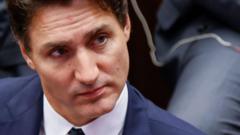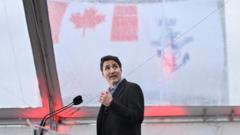Following a no-confidence vote, German Chancellor Olaf Scholz faces an early election scenario on February 23, highlighting shifts in party cohesion, rising populism, and challenges for centrist governance in Germany.
Olaf Scholz's No-Confidence Vote Signals Shift in German Politics

Olaf Scholz's No-Confidence Vote Signals Shift in German Politics
German Chancellor Olaf Scholz's recent no-confidence vote paves the way for early elections, reflecting deeper issues within German political dynamics.
German Chancellor Olaf Scholz has lost a parliamentary vote of confidence, resulting in early elections scheduled for February 23. Scholz initiated the vote, anticipating a defeat, but believed it was essential for reinvigorating his party's political stance after the collapse of his three-party coalition government two months earlier. This led to a minority administration where Scholz has struggled to govern effectively, relying on opposition support to pass legislation.
In the recent vote, 207 MPs—many from his party—supported Scholz, while 394 voted against him and 116 abstained. This outcome allows elections to take place sooner than the previously scheduled September date, as Scholz emphasized that voters should now chart the future political landscape of Germany. With the Social Democratic Party (SDP) trailing in the polls against the conservative Christian Democratic Union (CDU), led by Friedrich Merz, tensions are expected to rise as the election campaign heats up.
Scholz's decision to stage a potentially loss-inducing vote, referred to as a "kamikaze" move by the tabloid Bild, is a strategic play permitted under Germany's constitutional framework to trigger early elections and dissolve parliament. Historically, this mechanism has been utilized by past chancellors, including Gerhard Schröder, to escape political deadlock. However, the underlying issues in German politics extend beyond this incident, pointing to a fragmented party system where radical new forces are gaining traction.
The collapse of the coalition was notably centered around financial disagreements, especially around easing strict debt rules to support Ukraine and infrastructure initiatives, which were obstructed primarily by Scholz's finance minister from the Free Democratic Party (FDP). The fragmentation of political alliances has been alarming, exemplified by the rise of the far-right Alternative for Germany (AfD), which may impact the centrist parties’ ability to form stable coalitions.
As the February elections approach, Scholz’s SDP may need to consider various coalition options, despite his declining popularity. With Germany's traditional parties facing increased challenges from both the far-right and emerging far-left movements, the era of stable, consensual coalitions appears to be transitioning, raising questions about the future configuration of German politics.






















